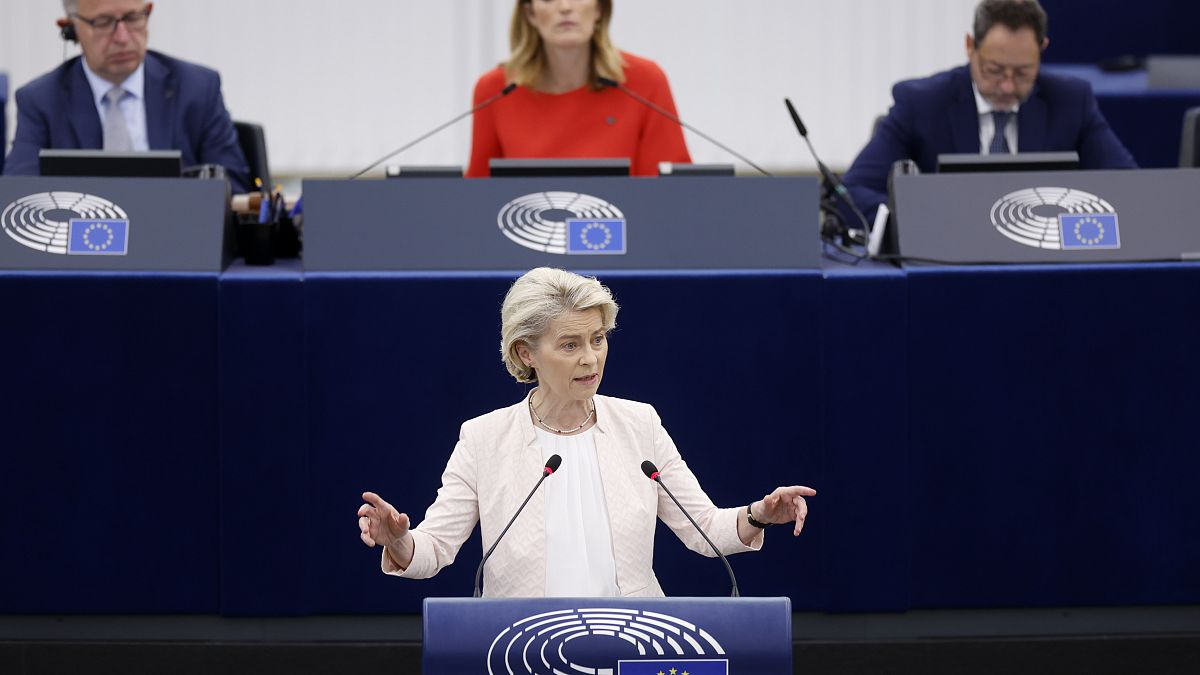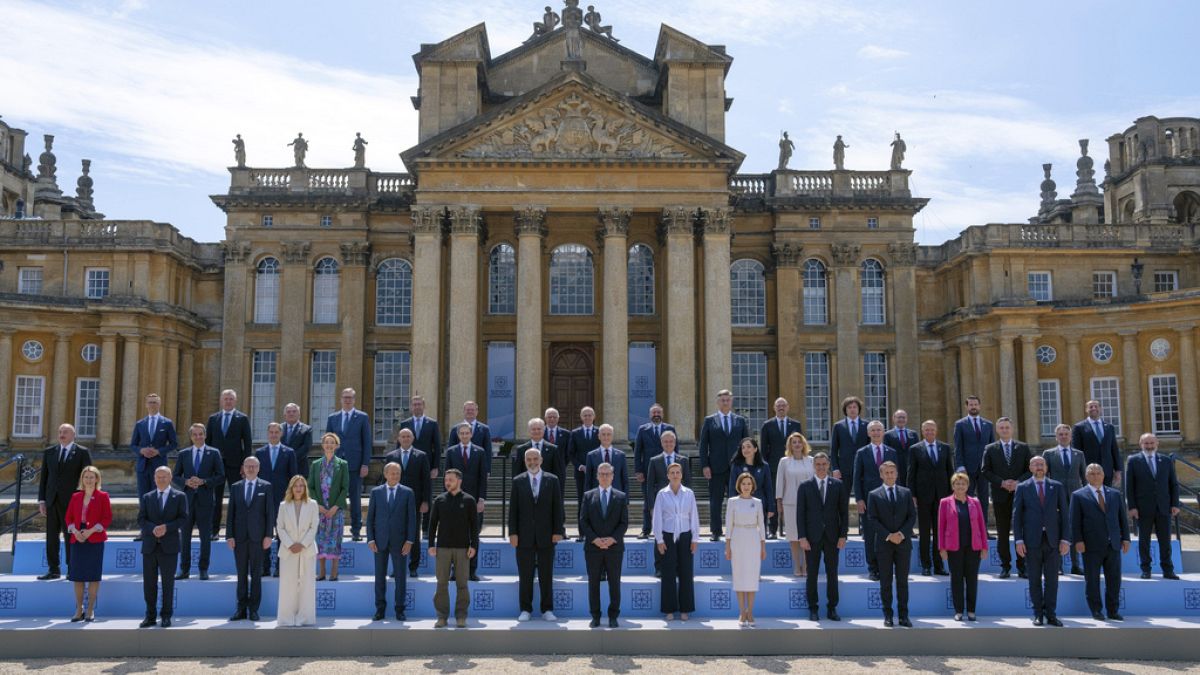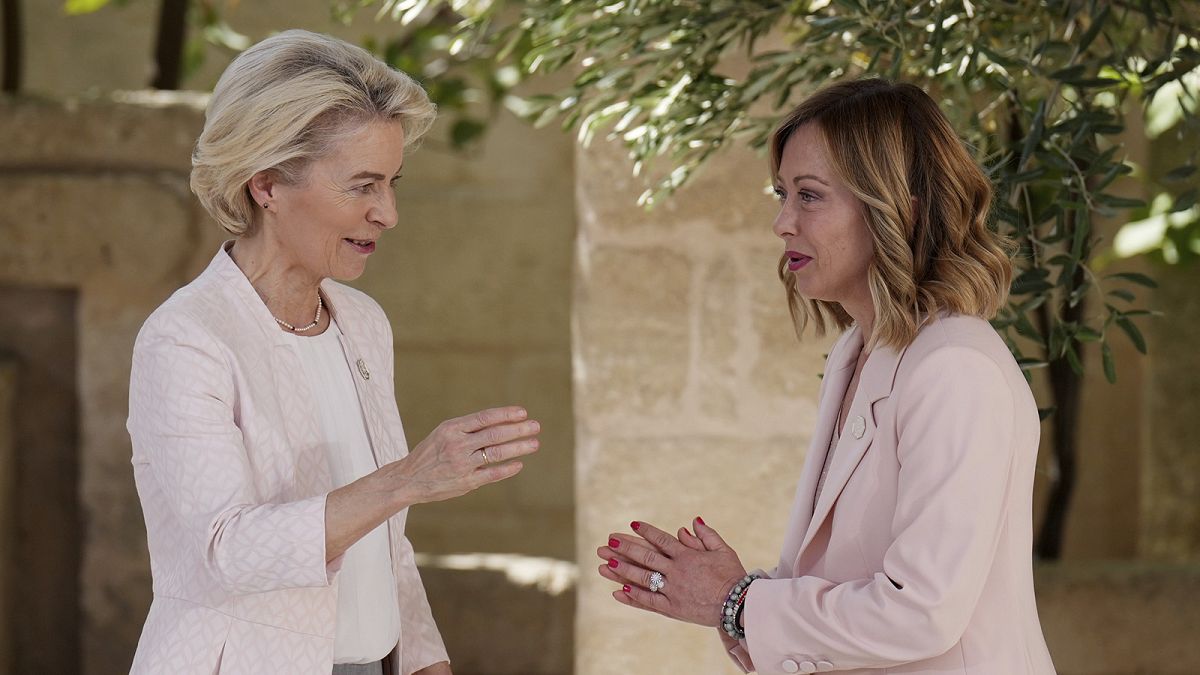World
Analysis: The EU's €7.4-billion bet on Egypt comes with high risks
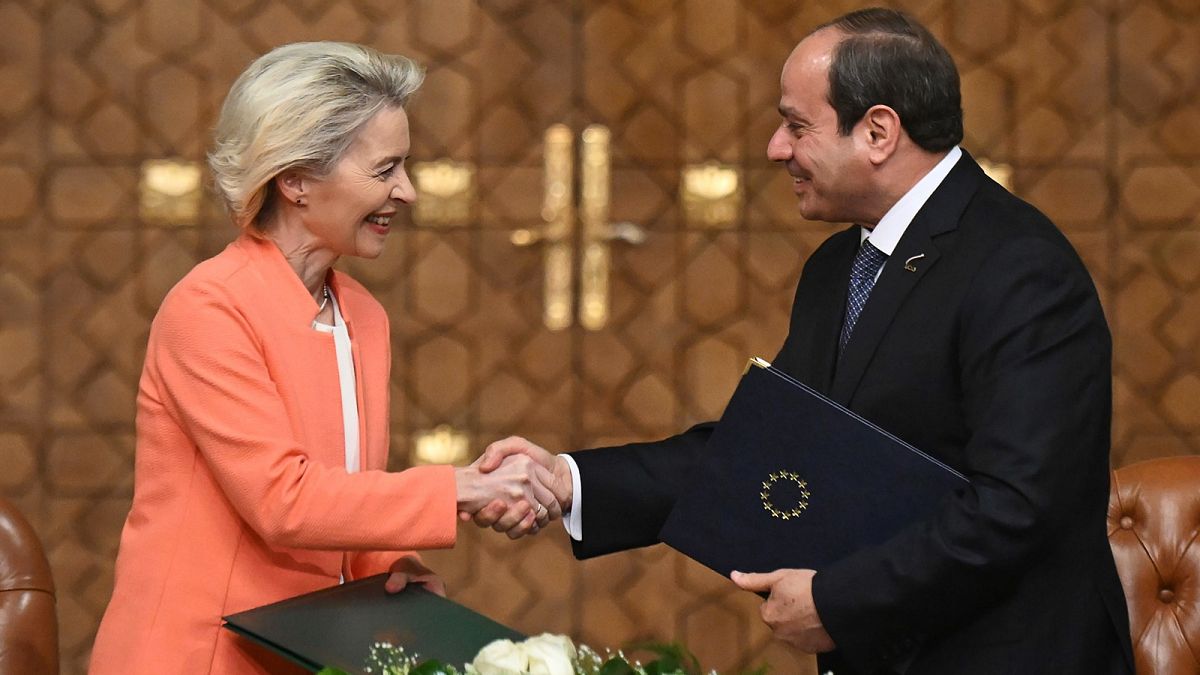
After Tunisia and Mauritania, the European Union has found a new “strategic” partner to curb irregular migration: Egypt.
The European Union over the weekend signed a €7.4 billion “comprehensive partnership” with Egypt, a number well over the €700 million and €210 million deals respectively struck with Tunisia and Mauritania.
The logic behind the three deals is however the same: to inject fresh money to help stabilise a wobbly economy and curb flows of irregular migration.
As European Commission President Ursuval von der Leyen said from Cairo, Egypt could not be avoided “given your political and economic weight, as well as your strategic location in a very troubled neighbourhood, the importance of our relations will only increase over time”.
For Egypt, the need is particularly pressing: the country is in the midst of a devastating crisis caused by a perfect storm of high inflation, heavy debt, persistent trade deficit, rising interest rates and a shortage of foreign currency. The woes have been made considerably worse by Russia’s war on Ukraine, which disrupted global wheat markets and pushed food prices to record highs, and the Houthi attacks on the Suez Canal, which have partially deprived Cairo of $10 billion in annual revenues.
The spiralling turmoil led Egypt to request its fourth loan from the International Monetary Fund (IMF) since 2016 worth $8 billion (€7.3 billion). In exchange, the country has agreed to devalue its national currency, introduce a floating exchange rate, slow down its spending on infrastructure and preserve debt sustainability.
The €7.4-billion deal with the EU also has a strong economic dimension: €5 billion in concessional loans to support Egypt’s macro-economic reforms and €1.8 billion in additional investments under the bloc’s neighbouring policy, to boost renewable energy and digital connectivity. On migration management, the agreement earmarks €200 million to crack down on human smuggling and trafficking as part of a wider package of €600 million in non-repayable grants.
At first glance, the €200-million envelope appears small in comparison, especially given that curbing irregular migration is a priority shared by all 27 member states, regardless of their political inclination, and that Egypt currently hosts over 500,000 refugees from nearby countries, mostly Sudan and Syria.
But Brussels sees things holistically: putting cash in one place can spill over into others. Under this thinking, boosting Egypt’s domestic economy can do as much – or perhaps even more – to control irregular migration than boosting actual border controls.
In the past few years, the EU has seen a dramatic rise in asylum applications by Egyptian nationals: from 6,616 in 2021 to 26,512 in 2023, according to the bloc’s asylum agency (EUAA). Most of these claims were registered in Italy (69%), followed by Greece at a distant second (9%). This helps explain why Prime Ministers Giorgia Meloni and Kyriakos Mitsotakis joined von der Leyen’s trip.
Notably, the marked increase in requests for international protection has not corresponded with a proportional increase in recognition rates. The EUAA estimates between 6 and 7% of these requests were successful, a very low number.
“Egyptians who migrate abroad are understood to be influenced primarily by economic factors and the search for employment,” the agency said in a study published in 2022, to explain why most of these applications for international protection were rejected.
The findings note that Egyptians seeking to reach Europe do not depart from Egyptian shores, as maritime borders are carefully guarded. Instead, most travel to Lybia, and then attempt to cross the Mediterranean Sea. A minority opts to fly to Turkey and try to enter the bloc via Bulgaria or Greece.
Additionally, the agency highlights Egypt’s position as a transit country for migrants coming from the Horn of Africa, who often rely on the same smugglers as Egyptians do.
‘Untied and undesignated’
The agency, however, points out two additional “push factors” that are driving the exodus of Egyptian nationals: the repression of human rights and the “security situation,” a reference to the anti-terrorism campaign in the Sinai peninsula.
Since the 2013 coup, Abdel Fattah al-Sisi, a former general, has strengthened his grip on power, expanded his presidential prerogatives and deepened the military’s role in civilian life, prompting accusations of clientelism, cronyism and corruption.
As a result, organizations like Freedom House, Human Rights Watch and Amnesty International describe Egypt as an authoritarian country where freedom of expression and assembly are legally recognised but severely restricted in practice. Courts, media and the private sector are subservient to the state and discrimination against minorities, such as LGBTQ+ people, Coptic Christians, Shiites and people of colour, is widespread. The reported use of torture and forced disappearance against political critics and dissenters have equally caused international alarm.
During her press conference with al-Sisi, von der Leyen vowed to “promote democracy and human rights” but did not elaborate further.
A Commission spokesperson later said human rights have been part of EU-Egypt relations since the entry into force of the Association Agreement in 2004 and would continue to be so under the reinforced partnership.
“There are many issues that need to be dealt with that require that we work with Egypt. We cannot pretend this country does not exist nor can we simply ignore it,” the spokesperson said, highlighting the work done to bring relief into the Gaza Strip.
The €5 billion in concessional loans will be disbursed under the agreement of “policy reforms,” the executive explained, but the ultimate use of this money, which will be wired straight into the Egyptian treasury, will be “untied and undesignated,” meaning the government will enjoy a comfortable margin of discretion for spending.
This big bet is flawed, says Claudio Francavilla, an associate director at Human Rights Watch, because it is overly focused on the fight against human trafficking and fails to address the rule-of-law decline that has contributed to the economic turmoil and pushed investors away from the country. Both the IMF and the EU statements spoke of the need to restore “confidence” to bring back foreign investment.
“The economic crisis in Egypt is very, very deeply intertwined with the human rights crisis,” Francavilla told Euronews.
“Egypt has pretty much a military authoritarian leadership that strangles every part of life in the country, including the economy, and through its repression has gotten rid that anything that resembles checks and balances on the power.”
“If you don’t address those issues, you’re simply kicking the can down the road,” he added. “The next crisis is just around the corner.”
Sara Prestianni, director of advocacy at EuroMed Rights, a human rights network, called on the bloc to make a “clear” link between pay-outs and the rule of law. Otherwise, the partnership “risks being only a legitimisation of the authoritarian drift that characterises al-Sissi’s regimes today. So, all these types of reforms, all this cooperation, must be strictly linked to conditionalities of respect for fundamental rights of the rule of law.”
Even if the Egyptian economy were to find a stable footing and Egyptian citizens had fewer reasons to leave their home country, as Brussels hopes under the multi-billion plan, there would still be an unresolved question over the fate of the Sudanese people and other nationalities who have sought refuge in the country or transit through its territory.
The European pressure to decrease irregular departures could encourage the Egyptian authorities to double down on their “repressive tools,” warns Andrew Geddes, the director of the Migration Policy Centre at the European University Institute (EUI), leading to greater suffering for those feeling war-torn nations.
“Asylum seekers in Egypt are very heavily reliant on humanitarian assistance, live in very bad conditions and have high unemployment levels. It’s unlikely that the resources provided by the EU will be directed by the Egyptian authorities to improve this situation,” Geddes told Euronews, calling the partnership a “transactional agreement.”
“The situation for asylum-seekers and refugees in Egypt may deteriorate and, for those that do try to move, the journeys may become even more dangerous and deadly.”

World
Celine Dion Makes Triumphant Comeback at Paris Olympics Opening Ceremony — Watch Full Performance

ad
World
95 Libyan nationals arrested in South Africa at suspected secret military training camp
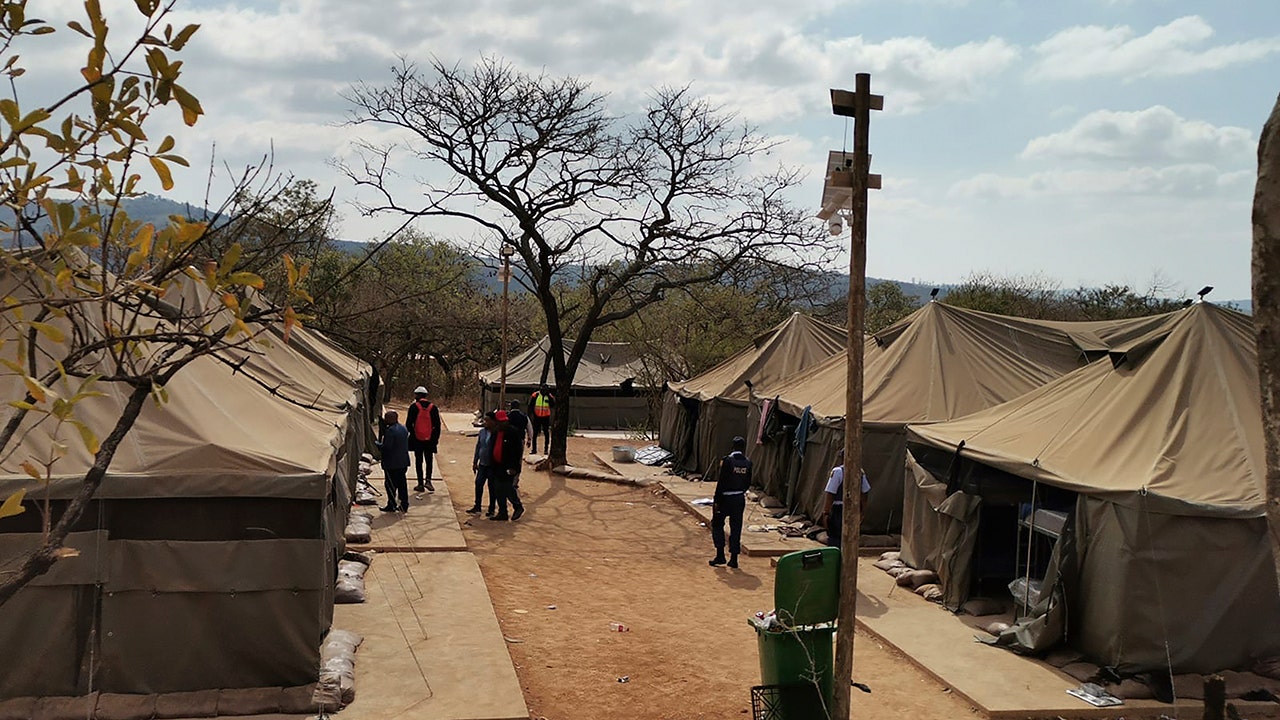
South African police arrested 95 Libyan nationals in a raid on a suspected secret military training camp on Friday and authorities said they were investigating whether there were more illegal bases in other parts of the country.
The camp was discovered at a farm in White River in the Mpumalanga province, about 360 kilometers (220 miles) northeast of Johannesburg, police said.
ELEPHANTS KILL TOURIST IN SOUTH AFRICA AFTER HE TRIED TO GET CLOSE TO TAKE PICTURES
National police spokesperson Athlenda Mathe said in a post on the social media site X that the Libyans stated they had entered the country on study visas to train as security guards, but police investigations suggest they have received military training.
The Newzroom Afrika TV news channel broadcast pictures of the site of the arrests, showing a military-style camp with large green and khaki tents set up in a row. Dozens of men were seen lining up as they were arrested. They were wearing civilian clothing.
Local government official Jackie Macie said investigations were ongoing and the owner of the farm would be questioned. He said authorities received information that there were similar secret camps near two other towns in Mpumalanga province.
A camp where 95 Libyan nationals were arrested on suspicion of running an illegal military camp are seen lining up after their arrest on Friday, July 26, 2024 in White River, South Africa. Police say that 95 Libyan nationals were arrested on suspicion of receiving training at a secret military camp in the north of the country. (AP Photo/Bulelwa Maphanga)
The province borders neighboring countries Mozambique and Swaziland and is an area of concern for South African authorities with regards to illegal immigration.
Police and authorities have not said whether the camps are suspected of being connected to a particular group or conflict.
Macie said investigations would establish if there was a network of camps in South Africa and show “why they are here doing military training in our country.”
Police said the men may be linked to crimes reported in communities close to the farm in recent months.
“We have serious cases which have been opened with the police, including cases of rape and armed robberies, which complainants claim were committed by unknown foreigners who seem to be of Asian descent,” said police spokesman Donald Mdhluli.
“We take what we have found here today very seriously because we don’t know who was training them, what were they being trained for and why that training is happening here in South Africa. It may be a threat not only to South Africa but also to the entire southern Africa region.”
Police said the operation to arrest the Libyans and close down the camp began two days ago. Macie said the Libyan nationals had been in the country since at least April.
“The 95 individuals taken into custody are all Libyan nationals and are currently being questioned by the relevant authorities,” Mpumalanga acting provincial police commissioner Maj. Gen. Zeph Mkhwanazi said in a statement.
Mdhluli, the police spokesman, said the country’s security regulator had confirmed that the kind of training that appears to have been taking place at the camp was well beyond the scope of training for security guards.
“The kind of equipment we found here shows that there was intense military training taking place here. This was basically a military base.”
World
Passengers face long, uncertain wait at stations amid rail disruption

A deliberate fire in a signal box about 60 km south of Lille caused the disruption on the northern high-speed line, with traffic halted around 5 a.m. local time on Friday.
Travel was severely disrupted in Lille on Friday, one of the stations affected by the sabotage that hit major French rail lines ahead of the Paris Olympics opening ceremony.
Many passengers waited with hope that soon turned to resignation.
“We’ve been waiting since 10:38 a.m. for the 11:38 a.m. train, and now we’re just waiting for it to arrive at 2:08 p.m.,” said Delphine, one of the stranded passengers.
“It’s still quite a delay, and we’ll be even later since we’re on a secondary route. I work in Avignon at 9 p.m., so it’s going to be very, very tight. We have a concert tonight — will it even happen? This is all very confusing, and we don’t understand what’s going on.”
For one traveller, this was a rough start to the holidays. “The worst case would be if the train is cancelled entirely and we have to buy new tickets for next week. It would shorten our already brief vacation. That would be a huge problem,” said Hippolyte.
When asked if he had been informed of the delays, Hippolyte said he received the notification just before departure.
“At around 10 a.m. this morning, we were told we were an hour late and would be leaving at 1 p.m.”
“It just keeps getting later as the day goes on. Every time we approach the new departure time, it gets pushed back another hour and a half, or half an hour each time.”
A deliberate fire in a signal box about 60 km south of Lille caused the disruption on the northern high-speed line. Traffic was halted around 5 a.m. on Friday.
The recent acts of sabotage on the rail network highlight that the Olympic Games are turning France into a prime target.
The attack disrupted the transport system on the opening day of the Games, causing delays of up to two hours or even cancellations that affected hundreds of thousands of passengers nationwide.
Authorities in Paris have said they are deploying substantial human resources to counter any threats and to ensure the safety of the events.
-

 World1 week ago
World1 week agoOne dead after car crashes into restaurant in Paris
-

 Midwest1 week ago
Midwest1 week agoMichigan rep posts video response to Stephen Colbert's joke about his RNC speech: 'Touché'
-

 News1 week ago
News1 week agoVideo: Young Republicans on Why Their Party Isn’t Reaching Gen Z (And What They Can Do About It)
-

 Movie Reviews1 week ago
Movie Reviews1 week agoMovie Review: A new generation drives into the storm in rousing ‘Twisters’
-

 News1 week ago
News1 week agoIn Milwaukee, Black Voters Struggle to Find a Home With Either Party
-

 Politics1 week ago
Politics1 week agoFox News Politics: The Call is Coming from Inside the House
-

 News1 week ago
News1 week agoVideo: J.D. Vance Accepts Vice-Presidential Nomination
-

 World1 week ago
World1 week agoTrump to take RNC stage for first speech since assassination attempt


